|
|
|
Sort Order |
|
|
|
Items / Page
|
|
|
|
|
|
|
| Srl | Item |
| 1 |
ID:
177936
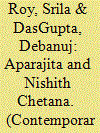

|
|
|
|
|
| Summary/Abstract |
This article examines self-making projects and the desire for respectability within queer lives in Kolkata, across distinct class-caste affiliations. We argue the desire for queer respectability take virtual forms, sartorial fashioning, and yet remains a convoluted project mirroring Kolkata’s relationship with neoliberal capitalism. The authors engage with a young lesbian identified activist and a young male fashion designer whose sexual identity remains tacit. Their virtual and real interactions reveal how both the characters conceal their caste and class status through projects of sartorial fashion in order to be read as appropriately queer. The article argues for understanding sexual and gender identities in relation with class, and caste status, as well as ethnic and religious identities, thereby revealing how the liberatory potentials of queer activism is a form of emergent neoliberal governmentality within contemporary India.
|
|
|
|
|
|
|
|
|
|
|
|
|
|
|
|
| 2 |
ID:
193167
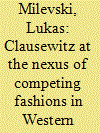

|
|
|
|
|
| Summary/Abstract |
The history of strategic thought is well trodden ground, but has not been approached from a fashion perspective. This article focuses on the issue of engagement among intellectual fashions by examining how events may lead observers to believe that established, long cycle ways of thinking have become partially, if not wholly, inapt, thereby leading to an uncertain and perhaps incomprehensible strategic environment. Newer, revisionist but often short-lived concepts emerge as a consequence, variously complementary to, despite, or in direct repudiation of longer-lived concepts or theories. This dynamic is examined through the interaction between Clausewitzian and competing fashions.
|
|
|
|
|
|
|
|
|
|
|
|
|
|
|
|
| 3 |
ID:
173950
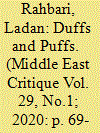

|
|
|
|
|
| Summary/Abstract |
In Iran, the politically sanctioned discourses of embodiment and body management are based on binary notions of gender and sexuality. These discourses are contested by social trends that reflect political dissent. This article uses a combination of content and visual analysis of three Instagram profiles dedicated to fashion to answer the question: ‘Is queer fashion present in Iranian cyberspace’ and if so, ‘How does it persist against the existing queer-phobic political forces?’ The article explores aesthetic and fashion categories called ‘duffs’ and ‘puffs’ that offer queer embodied extravaganza in Iranian cyberspace, which is a more relaxed geography of morality and leisure in comparison with offline public spaces. The analysis includes duffs and puffs’ life style and performance that entails excessive deployments of femininity and masculinity, and exploration of their political significance and potential to undo gender norms in Iran. While they do not explicitly reject heteronormativity and/or capitalism, their non-participation in the conventional modes of money-making, and their erotic and sexual performance contributes to transformative politics. They offer antagonism to the normative power of mainstream gender and sexual ideologies by staining their heterogeneity through performances of fun, shock and failure.
|
|
|
|
|
|
|
|
|
|
|
|
|
|
|
|
| 4 |
ID:
131774


|
|
|
|
|
| Publication |
2014.
|
| Summary/Abstract |
Drawing on twelve months of fieldwork in suburban Hyderabad, this paper explores the double binds experienced by middle-class young women as they attempt to meet the competing demands of 'respectable' and 'fashionable' femininity. For middle-class women, respectability requires purposeful movement, demure posture and modest clothing when in public, as well as avoidance of lower-class spaces where men congregate. Status can, however, also be achieved through more revealing fashionable clothing and consumption in elite public spaces. Whilst respectability for some sections of the middle class necessitates avoidance of even platonic relationships with the opposite sex, upper middle-class informants encourage heterosociality and for some upper middle-class and elite youth pre-marital romance is a form of 'fashion' due to its location in high-status spaces of leisure and consumption. The tensions described in this paper reveal the fragmentation of Hyderabad's middle class and the barriers to social mobility experienced by women for whom the relationship between legitimate cultural capital and feminine modesty is becoming increasingly complex.
|
|
|
|
|
|
|
|
|
|
|
|
|
|
|
|
| 5 |
ID:
193170
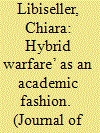

|
|
|
|
|
| Summary/Abstract |
The ‘hybrid warfare’ concept had been coined years earlier, but became fashionable only when it was adopted and adapted by NATO in 2014, after which academic interest suddenly sky-rocketed. Academics often adopted NATO’s understanding of the concept, took for granted its fit for Russian actions, and imported its political assumptions into the academic debate. The fashionability of the term also led to bandwagoning and thus superficial engagement with both the concept and the phenomenon it was applied to. This article outlines this process and its implications for the field of Strategic Studies.
|
|
|
|
|
|
|
|
|
|
|
|
|
|
|
|
| 6 |
ID:
113236
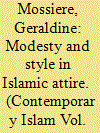

|
|
|
|
|
| Publication |
2012.
|
| Summary/Abstract |
My ethnographic fieldwork conducted with female converts to Islam in France and in Quebec (Canada) shows that, for these women, being Muslim does not necessarily mean wearing clothes with 'oriental' designs. Rather, they are starting their own clothing companies so as to produce distinct Muslim-Western fashions that they promote through the Internet. By interpreting Islam in a context where Muslims are a minority religious group, converts construct alternative religious and social representations of Muslim identity that accord with their feminist interpretation of the Qu'ran while simultaneously incorporating the Western background within which they were socialized. In this regard, the strategies that they develop for wearing the veil and for integrating into their environment (family, workplace, etc.) make it clear that fashion, religion and politics are interacting in multiple, creative ways. In this paper, I look at how new Muslim feminist subjectivities are produced and realized through habits of dress, resulting in new representations of the body. I explore this issue by considering dress and hairstyle strategies developed by Muslim converts, in order to examine new perspectives on the place of gender in religion as it relates to particular social contexts.
|
|
|
|
|
|
|
|
|
|
|
|
|
|
|
|
| 7 |
ID:
155746
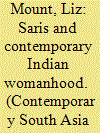

|
|
|
|
|
| Summary/Abstract |
Despite the major changes in urban middle-class Indian women’s clothing in the past 30 years, there are few accounts of women’s perspectives on their changing dress. This paper analyzes 31 semi-structured interviews with urban middle-class women in Delhi, Mumbai, and Pune to examine the changing meanings associated with saris in contemporary India. While the sari has entered the realm of global fashion and can thus be characterized as modern and sexy, the garment remains strongly associated with respect and maturity for women, particularly within their families, but also in public spaces and in the workplace. Women link their practices of sari wearing to modern aspirations by emphasizing saris as ‘modern’ fashionable attire, while simultaneously reinforcing the sari as a symbol of traditional, respectable married womanhood, thus exploiting the traditional meanings that the sari confers on them to their advantage. The emphasis on saris as simultaneously ‘modern’ and representative of Indian tradition indicates the cultural pressure placed on middle-class women to conform to dictates of traditional womanhood while also aligning themselves with modernity.
|
|
|
|
|
|
|
|
|
|
|
|
|
|
|
|
| 8 |
ID:
193169


|
|
|
|
|
| Summary/Abstract |
This article explores the fashion/popularity of the idea that the exercise of cyber power is a form of warfare. Specifically, the article explains the recent decline of the cyber warfare fashion in academia and discusses its implications for strategic studies. To achieve this, we synthesize observations from previous studies with new quantitative and qualitative data. The article contributes to a growing body of literature by tracing and explaining the history of a particular theme within strategic studies.
|
|
|
|
|
|
|
|
|
|
|
|
|
|
|
|
|
|
|
|
|